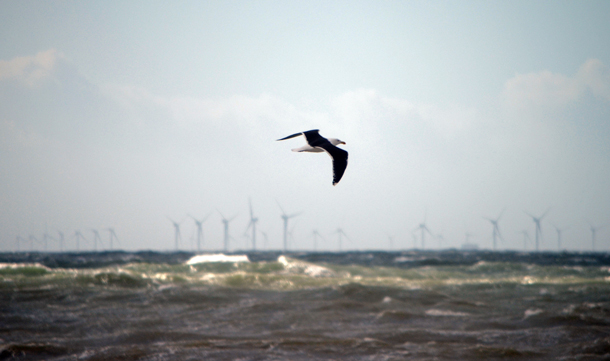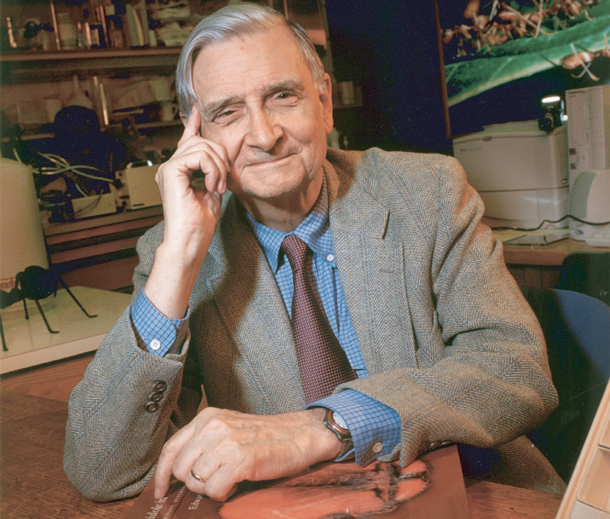Beyond the Headlines
Air Date: Week of June 7, 2019

One criticism of wind power is the danger the turbines can pose to birds, especially endangered ones. A.I. technology such as Identiflight is working to decrease the bird deaths caused by these turbines. (Photo: Neil, Flickr, CC BY 2.0)
This week, Peter Dykstra and Host Steve Curwood take a trip beyond the headlines to find some good news. First, they discuss an innovative technology that results in fewer wind turbine-caused bird deaths. Then, they examine initiatives around the world to decrease plastic pollution. Finally, the pair salute the birthday of legendary scientist and writer E.O. Wilson at age 90.
Transcript
CURWOOD: It's Living on Earth, I'm Steve Curwood. Well, it's time to take a look beyond the headlines now, with Peter Dykstra. He's an editor with Environmental Health News, that's EHN.org and DailyClimate.org. On the line from Atlanta, Georgia. Hey there, Peter, how are you doing? What's going on?
DYKSTRA: Hi, Steve, let's start with something upbeat, and constructive, and solution-oriented, and positive. And that's birds being killed by wind turbines.
CURWOOD: Uh, this is supposed to be good news, Peter?
DYKSTRA: Well, yeah, because we're talking about reducing bird deaths in wind turbines. It's been something that anti-wind people, including the President, have invoked as a way of opposing wind power and clean energy. But the solution part of the story comes with a technology called IdentiFlight. It involves artificial intelligence, video monitors, sensors. They identify the kinds of birds that may be approaching wind turbines. And if it's something like a golden eagle, a bird that is under serious risk in a lot of the American West, the system can identify that bird and actually shut the wind turbines down.
CURWOOD: Well, that sounds good. How well does this work, though?
DYKSTRA: They're still getting the bugs out of the bird system. It's been deployed a lot of places, particularly in the American West, and the wind industry is looking at it with extreme interest.
CURWOOD: Hmm, well, that sounds pretty good. So, any more good news for us this week, Peter?
DYKSTRA: Well, we've solved the plastics in the ocean problem, or at least a tiny, tiny, tiny bit of it. The state of California became the first state in the nation to ban those tiny plastic hotel shampoo bottles. So we can all pop the corks on those tiny champagne bottles and celebrate.

California has passed a bill banning the small plastic toiletry bottles often used in hotels in an effort to reduce single-use plastic waste. (Photo: Ashley Ringrose, Flickr, CC BY-NC-ND 2.0)
CURWOOD: [LAUGHS] Well, I don't know, Peter… But, you know, I have to say that I do find those little bottles annoying because you're at a hotel, you use, say half of the shampoo, or half of the conditioner, or half of the face wash, all the things that come in those little bottles. And then what do you do? Throw it away, which doesn't feel very good, or you take it with you, and then what are you going to do with it, then?
DYKSTRA: You develop a collection of half-empty shampoo bottles from hotels. It does reduce one thing from the waste stream, it helps maybe to make us a little bit aware of how we contribute to a huge problem like plastics in the ocean. But on the other hand, it does have a bad side, because it can anesthetize us to the larger problem, it can create the illusion that we've taken a big step towards solving ocean plastics, when we've actually taken just a tiny little step. Here's an example of a major step. The European Union has outlawed all single-use plastic items, grocery bags, disposable bottles by the year 2021. So having a single state bar a single plastic thing doesn't measure up to that. But let's hope it's the beginning of a major movement towards stemming the tide of plastics into our waterways and into our oceans.
CURWOOD: I can certainly agree with that. At this point in our gatherings, Peter, we typically look back at a note in history, and I'm wondering what you have today?
DYKSTRA: Well, how about a birthday party? June 10th is the 90th birthday of the legendary E.O. Wilson, the Harvard scientist who's won two Pulitzer Prizes for Nonfiction due to his fascination with ants.
CURWOOD: And his fascination with all the other creatures that we evolved with, which he put together in a hypothesis known as the biophilia hypothesis. That is, we evolve with everything else on the planet, so we need to have those creatures and those plants around us.

Harvard Professor E.O. Wilson is a biologist and author, sometimes called the “father of biodiversity”. (Photo: Jim Harrison, PLoS, Wikimedia Commons, CC BY 2.5)
DYKSTRA: And thus he's taught us a lot about biodiversity. His two Pulitzers – one was for a book called The Ants. Starting as a young boy born in Alabama, he documented all the ant populations in the state of Alabama, found what is believed to be the first invasive population of fire ants that entered the US through the port of Mobile, near his home. His other Pulitzer was for an earlier book called On Human Nature, where he took and applied his fascination with ant and insect behavior, and used it to teach how humans behave in everything from everyday life to sex.
CURWOOD: In other words, we're not all that different from the ants, and the termites, and the bees, and everything.
DYKSTRA: Well, we're two-legged mammals. They're six-legged insects, but we can learn a lot from them.
CURWOOD: Oh, thanks, Peter. Peter's an editor with Environmental Health News, that's EHN.org and DailyClimate.org. We'll talk to you again real soon.
DYKSTRA: All right, Steve, thanks a lot. Talk to you soon.
CURWOOD: And there's more on these fairly good news stories at the Living on Earth website, LOE.org.
Links
The Revelator | “AI-Backed Sensors Help Reduce Wind Turbine Risks to Protected Birds”
Mother Jones | “California Passes Ban on . . . Hotel Shampoo Bottles”
The Guardian | “European Parliament Votes to Ban Single-Use Plastics”
Read more about E. O. Wilson at The E. O. Wilson Biodiversity Foundation’s website
Living on Earth wants to hear from you!
Living on Earth
62 Calef Highway, Suite 212
Lee, NH 03861
Telephone: 617-287-4121
E-mail: comments@loe.org
Newsletter [Click here]
Donate to Living on Earth!
Living on Earth is an independent media program and relies entirely on contributions from listeners and institutions supporting public service. Please donate now to preserve an independent environmental voice.
NewsletterLiving on Earth offers a weekly delivery of the show's rundown to your mailbox. Sign up for our newsletter today!
 Sailors For The Sea: Be the change you want to sea.
Sailors For The Sea: Be the change you want to sea.
 The Grantham Foundation for the Protection of the Environment: Committed to protecting and improving the health of the global environment.
The Grantham Foundation for the Protection of the Environment: Committed to protecting and improving the health of the global environment.
 Contribute to Living on Earth and receive, as our gift to you, an archival print of one of Mark Seth Lender's extraordinary wildlife photographs. Follow the link to see Mark's current collection of photographs.
Contribute to Living on Earth and receive, as our gift to you, an archival print of one of Mark Seth Lender's extraordinary wildlife photographs. Follow the link to see Mark's current collection of photographs.
 Buy a signed copy of Mark Seth Lender's book Smeagull the Seagull & support Living on Earth
Buy a signed copy of Mark Seth Lender's book Smeagull the Seagull & support Living on Earth

